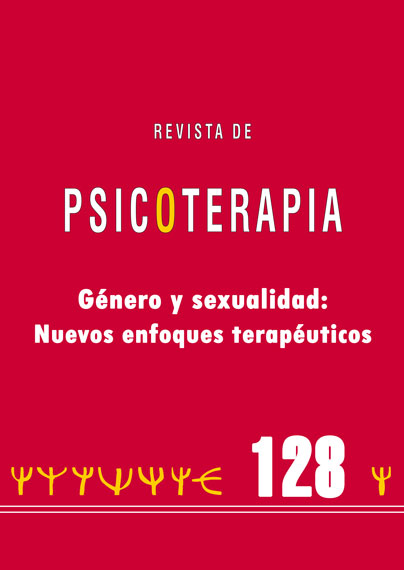A Procedure for Case Conceptualization and Psychotherapeutic Process Planning with Fuzzy Cognitive Maps of the Clients System of Personal Meanings [2C3P-FCM]
DOI:
https://doi.org/10.5944/rdp.v35i128.41435Keywords:
Fuzzy Cognitive Maps, Personal Construct Psychology, Systems Thinking, case conceptualization, psychotherapy planningAbstract
A procedure is presented for case conceptualization and psychotherapeutic process planning using Fuzzy Cognitive Maps (FCMs) of the clients' systems of personal meanings. This tool, integrated with Personal Construct Psychology and Systems Thinking principles, allows modeling the client's dynamic system, identifying its components, analyzing patterns and interactions, and relating it to known systemic archetypes. This enables a deep and idiographic understanding of the situation, glimpsing the underlying structures and mental models that generate dysfunctional dynamics. Its application is demonstrated through a clinical case. The procedure lays the groundwork for designing personalized interventions that promote transformative changes at multiple levels, addressing the complexity of human systems with equally complex and dynamic methods and models.
Downloads
References
Botella, L. (2007). Usos potenciales de la lógica borrosa. Aplicación de mapas cognitivos borrosos (MCBs) para el manejo de los casos clínicos en psicoterapia. Revista Argentina de Clínica Psicológica, 16(2), 103-119.
Botella García del Cid, L. (2019).
Las respuestas que obtienes dependen de las preguntas que haces: la
investigación en Psicoterapia revisitada [The Answers you get depend on the questions you ask:
Psychotherapy Research Revisited]. Acción Psicológica, 17(1), 1–12. https://doi.org/10.5944/ap.17.1.27809
Botella García del Cid, L. (2019).
Las respuestas que obtienes dependen de las preguntas que haces: la
investigación en Psicoterapia revisitada [The Answers you get depend on the questions you ask:
Psychotherapy Research Revisited]. Acción Psicológica, 17(1), 1–12. https://doi.org/10.5944/ap.17.1.27809
Botella García del Cid, L. (2019).
Las respuestas que obtienes dependen de las preguntas que haces: la
investigación en Psicoterapia revisitada [The Answers you get depend on the questions you ask:
Psychotherapy Research Revisited]. Acción Psicológica, 17(1), 1–12. https://doi.org/10.5944/ap.17.1.27809
Botella, L. (2019). Las respuestas que obtienes dependen de las preguntas que haces: la
investigación en Psicoterapia revisitada. Acción Psicológica, 17(1), 1–12. https://doi.org/10.5944/ap.17.1.27809.
Botella, L. (2020). La Construccion del Cambio Terapeutico: Terapia Constructivista Integradora en la Práctica Clínica. Desclée de Brouwer. ISBN: 978-84-330-3124-2.
Botella, L. (2021). La Cartografía de los Espacios Psicológicos: Aplicaciones Psicoterapéuticas de las Dinámicas Sistémicas de Mapas Cognitivos Borrosos de Constructos Personales. Revista de Psicoterapia, 32(118), 237–252. https://doi.org/10.33898/rdp.v32i118.474
Botella, L., Barrado, E., Sanfeliciano, A., & Saúl, L. A. (2022). Formulación de caso mediante Mapas Cognitivos Borrosos: Bases conceptuales y metodológicas y ejemplo de caso. Revista de Psicoterapia, 33(123), 79-110. https://doi.org/10.33898/rdp.v33i123.35946
Burger, J., van der Veen, D.C., Robinaugh, D.J. et al. (2020) Bridging the gap between complexity science and clinical practice by formalizing idiographic theories: a computational model of functional analysis. BMC Med 18, 99 (2020). https://doi.org/10.1186/s12916-020-01558-1
Dana D. (2018). The Polyvagal Theory in Therapy: Engaging the Rhythm of Regulation. First edition. W.W. Norton & Company; 2018.
Hayes AM & Andrews LA. (2020). A complex systems approach to the study of change in psychotherapy. BMC Med. 2020 Jul 14;18(1):197. doi: 10.1186/s12916-020-01662-2. PMID: 32660557; PMCID: PMC7359463.
Kelly, G.A. (1955/1991). The psychology of personal constructs (Vols. 1 and 2). London:Routledge.
Kosko, B., 1986. Fuzzy cognitive maps. International Journal of
Man–Machine Studies 24, 65–75
Kosko, B., (1986). Fuzzy cognitive maps. International Journal of Man–Machine Studies 24, 65–75.
Meadows, D. (5 May 2024). Dancing with Systems. https://donellameadows.org/archives/dancing-with-systems/
Senge, P. (2006). The Fifth Discipline: The art and practice of the learning organization. Random House Books.
Saúl, L. A., Botella, L., & Sanfeliciano, A. (2023). Utilización de Mapas Cognitivos Borrosos en Supervisión Clínica en Psicoterapia. Revista de Psicoterapia, 34(126), 133–148. https://doi.org/10.5944/rdp.v34i126.38710
Saúl, L. A., Sanfeliciano, A., Botella, L., Perea, R., & Gonzalez-Puerto, J. A. (2022). Fuzzy Cognitive Maps as a Tool for Identifying Cognitive Conflicts That Hinder the Adoption of Healthy Habits. International Journal of Environmental Research and Public Health, 19(3). https://doi.org/10.3390/ijerph19031411
Downloads
Published
How to Cite
Issue
Section
License
Copyright (c) 2024 Revista de Psicoterapia

This work is licensed under a Creative Commons Attribution-NonCommercial 4.0 International License.
Authors who publish in this journal accept the following conditions:
-
Authors retain copyright and grant the journal the right of first publication, with the work registered under the Creative Commons CC-BY-NC 4.0 International license. This license allows third parties to cite the text and use it without alteration and for non-commercial purposes, provided they credit the authorship of the work and its first publication in this journal.
-
Authors may enter into other independent and additional contractual agreements for the non-exclusive distribution of the version of the article published in this journal (e.g., including it in an institutional repository or publishing it in a book), provided they clearly indicate that the work was first published in this journal.
-
The views expressed in the articles are solely the responsibility of the authors and in no case do they reflect the opinions or scientific policies of the journal.















